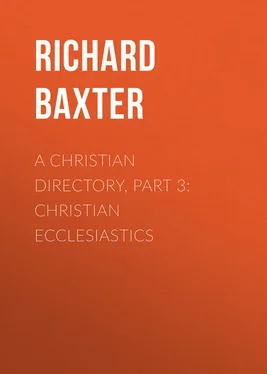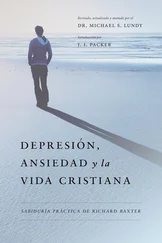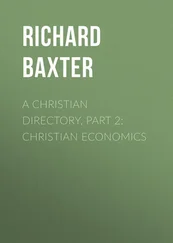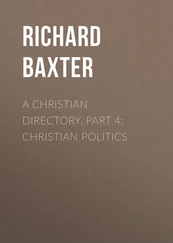Richard Baxter - A Christian Directory, Part 3 - Christian Ecclesiastics
Здесь есть возможность читать онлайн «Richard Baxter - A Christian Directory, Part 3 - Christian Ecclesiastics» — ознакомительный отрывок электронной книги совершенно бесплатно, а после прочтения отрывка купить полную версию. В некоторых случаях можно слушать аудио, скачать через торрент в формате fb2 и присутствует краткое содержание. Жанр: foreign_antique, foreign_prose, на английском языке. Описание произведения, (предисловие) а так же отзывы посетителей доступны на портале библиотеки ЛибКат.
- Название:A Christian Directory, Part 3: Christian Ecclesiastics
- Автор:
- Жанр:
- Год:неизвестен
- ISBN:нет данных
- Рейтинг книги:3 / 5. Голосов: 1
-
Избранное:Добавить в избранное
- Отзывы:
-
Ваша оценка:
- 60
- 1
- 2
- 3
- 4
- 5
A Christian Directory, Part 3: Christian Ecclesiastics: краткое содержание, описание и аннотация
Предлагаем к чтению аннотацию, описание, краткое содержание или предисловие (зависит от того, что написал сам автор книги «A Christian Directory, Part 3: Christian Ecclesiastics»). Если вы не нашли необходимую информацию о книге — напишите в комментариях, мы постараемся отыскать её.
A Christian Directory, Part 3: Christian Ecclesiastics — читать онлайн ознакомительный отрывок
Ниже представлен текст книги, разбитый по страницам. Система сохранения места последней прочитанной страницы, позволяет с удобством читать онлайн бесплатно книгу «A Christian Directory, Part 3: Christian Ecclesiastics», без необходимости каждый раз заново искать на чём Вы остановились. Поставьте закладку, и сможете в любой момент перейти на страницу, на которой закончили чтение.
Интервал:
Закладка:
It is one of Solon's sayings in Laertius, p. 51, Probitarem jure-jurando certiorem habe. What will not an atheistical impious person say or swear, for advantage?
63
Nunc nunc qui fœdera rumpit, Ditatur: Qui servat eget. Claudian.
64
See Dr. Sanders. p. 47, and 197.
65
Cicero de Leg. lib. 1. proveth that right is founded in the law of nature, more than in man's laws; else, saith he, men may make evil good, and good evil, and make adultery, perjury, &c. just by making a law for them.
66
How often perjury hath ruined christian princes and states all history doth testify. The ruin of the Roman empire by the Goths, was by this means. Alaricus having leave to live quietly in France, Stilico comes in perniciem Reipub. Gothos pertentans, dum eos insidiis aggredi cuperet, belli summam Saulo pagano duci commisit: qui ipso sacratissimo die Paschæ, Gothis nil tale suspicantibus, super eos irruit, magnamque eorum partem prostravit. Nam primum perturbati Gothi, ac propter religionem cedentes, demum arma corripiunt, victoremque virtute potiori prosternunt exercitum: hinc in rabiem furoris excitantur. Cœptum iter deferentes, Romam contendunt petere, cuncta igne ferroque vastantes: nec mora; venientes urbem capiunt, devastant, incendunt, &c. Paul. Diaconus, lib. 3.
67
Sanders. p. 30, 31.
68
Sanders. p. 32-41.
69
Sanders. p. 41-44. Ubi de justo sensu ambigitur, longe satius est et naturæ rei accommodatius, strictiore quam benigniore uti interpretatione. ibid. p. 44.
70
Sanders. p. 45.
71
They were ill times that Abbas Uspergensis describeth Chron. p. 320. Ut omnis homo jam sit perjurus, et prædictis facinoribus implicatus, ut vix excusari possit, quin sit in his, sicut populus, sic et sacerdos: Oh that this calamity had ended with that age! Et. p. 321. Principes terrarum et barones, arte diabolica edocti, nec curabant juramenta infringere, nec fidem violare, et jus omne confundere.
72
Sand. p. 193. Cas. 48.
73
Sanders. p. 122-133.
74
Sanders. p. 50.
75
Sanders. p. 55, 56. In quo casu locum habet quod vulgo dicitur, Fieri non debet, factum valet: possumus ergo distinguere, juramentum dici illicitum duobus modis. Vel respectu rei juratæ, vel respectu actus jurandi: Juramentum illicitum respectu rei juratæ nullatenus obligat: Juramentum illicitum respectu actus jurandi obligat, nisi aliunde impediatur.
76
Sanderson, p. 72, 73. Dico ordinarie quia fortassis possunt dari casus in quibus juramentum quod videtur alicui legi communitatis aut vocationis adversari, etsi non debuerit suscipi, susceptum tamen potest obligare: ut e. g. in lege pœnali disjunctiva. See the instances which he addeth. Joseph took an oath of the Israelites, to carry his bones out of Egypt, Gen. l. 25. What if Pharaoh forbid them? Are they acquit? The spies swore to Rahab, Josh. ii. 12, 18. Had they been quit if the rulers had acquit them?
77
Read of this at large, Amesii Cas. Cons. l. v. c. 5. qu. 4.
78
And si infringendo infregerit ea vir ejus, v. 12. Vir ejus infregit ea, v. 13.
79
Dr. Sanderson, Prælect. 4. sect. 5. p. 104, 105, limiteth it to De his rebus in quibus subest: in those same things in which one is under another's government; adding, sect. 6, a double exception: Of which one respecteth the person of the swearer, the other the consent of the superior: the first is that As to the person of the swearer, there is scarce any one that hath the use of reason that is so fully under another's power, but that in some things he is sui juris , at his own power: and there every one may do as pleases himself, without consulting his superior, so as that by his own act, without his superior's license, he may bind himself. 2. As to the consent of a superior, A tacit consent, antecedent or consequent, sufficeth. Quasi diceret, si dissensum suum vel uno die dissimulet, votum in perpetuum stabilivit.
80
Sanderson, p. 73.
81
Sanders. Præl. iii. sect. 12.
82
Psal. xv. 4.
83
Sanders. p. 80, 81.
84
Sanders. p. 82.
85
Ibid. p. 122.
86
Sanders. p. 120, 121. This seemeth the case of Isaac in blessing Jacob: the error personæ caused by Jacob's own deceit did not nullify the blessing, because it was fixed on the determinate person that it was spoken to.
87
Sanders. p. 84.
88
Disput. ii. of Church Government, chap. i. and Universal Concord.
89
Of the difference between fixed and unfixed ministers, see my Disput. ii. iii. of Church Government, and Jos. Acosta lib. v. c. 21, 22, de Missionibus.
90
Rom. x. 7, 14; Mark xvi. 15; Matt. xxviii. 19, 20.
91
2 Cor. v. 19-21; Acts xxvi. 17, 18; Eph. ii. 19; Acts ii. 37-40.
92
Tit. i. 7; 1 Cor. iv. 1, 2; Matt. xxviii. 19, 20; Acts xx. 32; 1 Cor. iii. 11, 12.
93
Acts xiv. 23; 2 Tim. ii. 2; Acts xiii. 3; ii. 41, 42; vi. 2; xx. 7, 28; 1 Tim. v. 17; Titus i. 5; Acts xx. 30, 31; Col. i. 28; Eph. iv. 11, 42; Mal. ii. 7; 1 Tim. v. 17.
94
1 Cor. xiv. 16, 26; Acts xx. 7, 36; James v. 14; Acts vi. 4; ii. 42; Phil. i. 4; Neh. xi. 24; xi. 17; 1 Cor. xi. 24; x. 16; Heb. vii. 7; Tit. ii. 15; i. 9, 11; 1 Tim. v. 19; iii. 5; Tit. iii. 10; Matt. xviii. 17, 18; 1 Cor. v. 4, 11, 13; Eph. iv. 13, 14; Acts xv.
95
Princes may force their subjects by the temporal sword which they bear: bishops may not force their flock with any corporal or external violence. Bilson, Christ. Subjection, p. 525.
96
Dr. Hammond Annot. q. d. The bishops of your several churches, I exhort – Take care of your several churches, and govern them, not as secular rulers, by force, but as pastors do their sheep, by calling and going before them, that so they may follow of their own accord. If you would know the true nature and extent of the bishop's work and office, read carefully the said Dr. Hammond's Paraphrase on Acts xx. 20, 28; Heb. xiii. 7, 17; 1 Tim. v. 17; 1 Thess. v. 12; Heb. xiii.; Annot. a. Tit. iii. 10; 1 Cor. xii. 28; Annot. e. Jam. v. 14; Annot. Acts xi. 30; Annot. b. Acts xiv. 23.
97
Chrysost. cited by Bilson. p. 525. But if any man wander from the right path of the christian faith, the pastor must use great pains, care, and patience. For he may not be forced, nor constrained with terror, but only persuaded to return entirely to the truth. – A bishop cannot cure men with such authority as a shepherd doth his sheep. – For of all men christian bishops may least correct the faults of men by force, p. 526. Matt. xx. 26; Mark x. 43. See Psal. ciii. 21; civ. 4; Isa. xvi. 6; Jer. xxxiii. 21; Joel i. 9, 13; ii. 17; 2 Cor. xi. 23; Acts xxvi. 26; Rom. xv. 16; Eph. iii. 7; Col. i. 23, 25; 1 Tim. iv. 6; 1 Thess. iii. 2; Col. i. 7.
98
Functiones in ecclesia perpetuæ sunt duæ, Presbyterorum et Diaconorum: Presbyteros voco cum omni ecclesia veteri eos, qui ecclesiam pascunt verbi prædicatione, sacramentis et clavibus; quæ jure divino sunt individua. Grotius de Imperio, p. 267. c. 10.
Читать дальшеИнтервал:
Закладка:
Похожие книги на «A Christian Directory, Part 3: Christian Ecclesiastics»
Представляем Вашему вниманию похожие книги на «A Christian Directory, Part 3: Christian Ecclesiastics» списком для выбора. Мы отобрали схожую по названию и смыслу литературу в надежде предоставить читателям больше вариантов отыскать новые, интересные, ещё непрочитанные произведения.
Обсуждение, отзывы о книге «A Christian Directory, Part 3: Christian Ecclesiastics» и просто собственные мнения читателей. Оставьте ваши комментарии, напишите, что Вы думаете о произведении, его смысле или главных героях. Укажите что конкретно понравилось, а что нет, и почему Вы так считаете.












